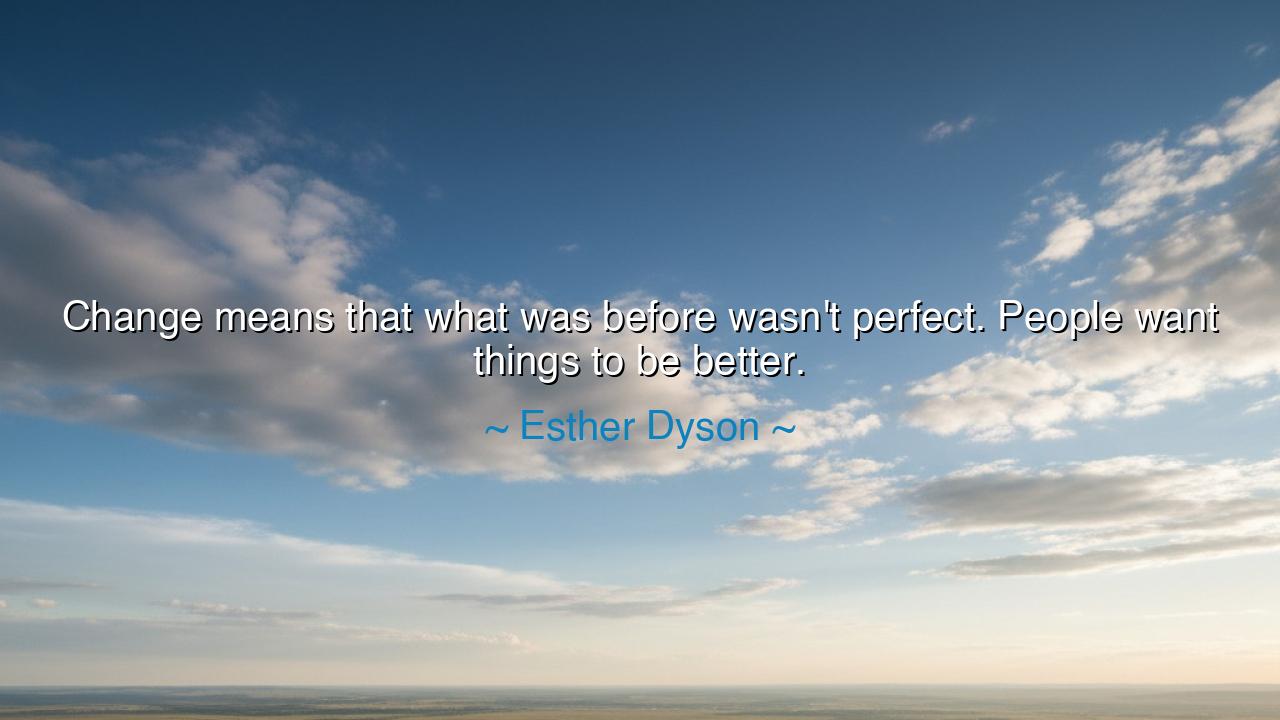
Change means that what was before wasn't perfect. People want






Opening Scene
The room is softly illuminated, the glow of a nearby lamp casting warm light across the space as the evening unfolds. Outside, the world quiets, the noise of the city fading into stillness. Jack sits at the table, his hands resting on an open book, lost in thought. Jeeny stands by the window, looking out at the view below. There’s a quiet sense of contemplation in the room, as if a deeper conversation is about to begin.
Host: After a few moments, Jeeny turns from the window, her voice thoughtful but steady, breaking the silence.
Jeeny: “I came across a quote by Esther Dyson that really made me reflect. She said, ‘Change means that what was before wasn’t perfect. People want things to be better.’ It got me thinking about how we perceive change and why we often resist it. It’s like we want things to evolve, but we’re also attached to the way things were. What do you think about the idea that change highlights imperfections, and that’s what drives us to seek something better?”
Jack: “It’s such a fascinating perspective, isn’t it? Change isn’t just about new things; it’s about recognizing that what was before didn’t fully meet our needs. It’s a reflection of our desire for improvement — for something better. People are naturally inclined to want better outcomes, better systems, better ways of living. But at the same time, change forces us to confront the fact that what we had before wasn’t perfect. It’s a bit uncomfortable, but it’s that discomfort that pushes us to improve.”
Jeeny: “Exactly. And I think that’s why change can be so challenging. It’s not just about introducing something new; it’s about confronting the imperfections of the past and the recognition that we are the ones who can make things better. It’s like a call to action — if we want things to improve, we have to be willing to accept that what came before wasn’t enough, and that we have the responsibility to push for something more.”
Jack: “Right. It’s like a double-edged sword. On one hand, we want change, we want improvement, but on the other hand, change often means that we have to let go of the old, the familiar — even if it wasn’t perfect. And that can be difficult because it forces us to acknowledge that we were, in a sense, settling before. But the fact is, people naturally strive for progress. We want to see things improve, and that means we have to accept the discomfort of change.”
Host: The conversation deepens, as the weight of Dyson’s words resonates in the room. Jack places his book aside, clearly thinking about the broader implications, while Jeeny sits across from him, her voice steady as she continues.
Jeeny: “It’s interesting how imperfection drives us forward. It’s like the very thing that makes us uncomfortable — recognizing that something isn’t quite right — is what sparks innovation. When things are ‘perfect,’ there’s often no incentive for change. But when we see flaws or limitations, that’s when we get the urge to improve. It’s the recognition of imperfection that creates a desire for a better future.”
Jack: “Exactly. And it’s important to remember that perfection isn’t always the goal. It’s improvement, not perfection. Sometimes, what we consider ‘perfect’ in one moment may be outdated or irrelevant in the next. Change is the natural response to evolving needs and circumstances. And rather than resisting it, we need to embrace the idea that imperfection is just part of the process — it’s what pushes us to keep growing.”
Jeeny: “Right. It’s about being willing to evolve and accept that we don’t have all the answers right now. Change is often messy, and it challenges our assumptions, but it’s necessary for progress. And the beauty of that is that progress isn’t a straight line. It’s a journey full of trial and error, and the willingness to confront what’s not perfect is what ultimately leads to something better.”
Jack: “That’s a great point. Change isn’t easy, and it’s not always comfortable, but it’s how we progress. The desire for betterment comes from recognizing that what was before wasn’t enough, and that’s a really powerful motivator. We may not always get it right, but by pushing forward and learning from our mistakes, we improve — and that’s the heart of growth.”
Host: The room feels quieter now, as though their thoughts have settled into a deeper understanding. Outside, the world continues, but inside, Jack and Jeeny share the realization that change is often driven by the recognition of imperfection. It is in confronting the flaws of the past that we find the desire to make things better, to evolve, and to create something more meaningful.
Jeeny: “So, maybe the lesson here is that we need to embrace imperfection, not as a failure but as an opportunity for improvement. Change is uncomfortable because it forces us to confront the ways in which things weren’t perfect, but that discomfort is what drives us toward something better.”
Jack: “Exactly. Change is about growth, and growth requires us to face what isn’t working, learn from it, and improve. Imperfection is not something to fear; it’s a stepping stone toward progress.”
Host: As the evening continues, the conversation wraps up with a quiet understanding. Change isn’t just about new things; it’s about recognizing the imperfections of the past and using them as fuel for progress. By embracing change, we open ourselves up to the opportunity to grow, to evolve, and to create something better — for ourselves and for the world around us.






AAdministratorAdministrator
Welcome, honored guests. Please leave a comment, we will respond soon